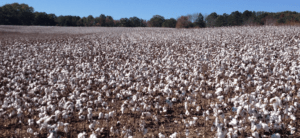
Farmers and agriculture are the backbone of our state, but the farming industry is the most financially and emotionally challenged sector in North Carolina.
Farm Bureau reported that in the 12 months leading up to September, 2019, 18 farms filed Chapter 12 bankruptcies–up from 10 the previous year.
Challenges Facing Farmers
NC farmers grow a lot of cotton. Over 10 years ago at TS Designs, we created Cotton of the Carolinas to create a brand that connected the cotton grown here from dirt to shirt–all in the Carolinas–in a completely transparent supply chain.
Today, the majority of the cotton grown here is exported–usually as yarn for the major apparel brands that are chasing much cheaper labor in developing countries.
“We believe when brands go outside of their communities for a product or service that their markets could deliver, it’s equal to cheating the system. It doesn’t really matter how cheap a t-shirt is if our neighbors don’t have jobs because all the work has gone somewhere else,” says CEO Eric Henry.
We’ve learned firsthand this is what “commodity” agriculture means. Farmers plant their cotton seed, then about eight months later when they harvest it, the market tells them what they’ll get paid. This is true from cotton to wheat, beef to pork. Farmers make the investment, and the market tells them the price–usually after harvest.
Solutions for Farmers
For years, the solution for farmers has been exporting, but as we’ve seen–and we’ll continue to see–we don’t have a lot of control over those markets. We do live in a global economy, but we cannot legislate the global economy. What we can do is take care of our communities.
With Cotton of the Carolinas, we did that by asking farmers what they needed to be paid for their cotton, without letting the global market dictate the price.
We believe long-term opportunities for NC’s farming industry lie in solutions like these that build relationships. We can create value-added products in the Carolinas and the rest of the US by showing value beyond price.
New Opportunities for NC Agriculture
Another opportunity to keep farmers at the table and in the conversation has come in the legalization of hemp. Our CEO Eric Henry is now working with a group of folks from across the state to build a supply chain in the Carolinas from the seed to the brand. He also helped to form and raise money to start the NC Industrial Hemp Commission.
Last year, we put together a white paper that outlines our hemp vision, and Eric had the opportunity to travel to both Denver, CO, and Vancouver, BC, with fellow Tar Heels to promote North Carolina as the best place for hemp to be grown, processed and manufactured.
NC farmers can grow hemp, and we still have the best textile, academic, and manufacturing infrastructure in the country to go from fiber to apparel. This is just one example of a successful pathway for NC’s farming industry and a long-term economic and environmental win for our state.
Henry says, “We look at our supply chains as partners to build a better t-shirt and not a tool to maximize our bottom line. We have to reframe the discussion around agriculture, and find ways to bring and keep the farmer at the table. The value of our farms cannot be measured solely by the cost of tomatoes or t-shirts at the local big box store.”
